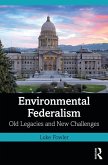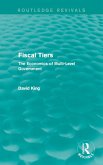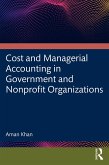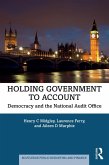Examining patterns of pollution and case studies from the Clean Air Act and the Clean Water Act, Fowler explores two questions: has environmental federalism worked in managing legacy environmental problems, and can it work to manage climate change? In order to answer these questions, Fowler extends James Lester's typology using political incentives and administrative capacities to identify four types of states (progressive, delayers, strugglers, and regressives) and assesses how they are linked to the success of federal environmental programs and conf licts in intergovernmental relations. He then considers what lessons we can learn from these programs and whether those lessons can help us better understand climate policy and multi-level institutions for environmental governance.
This timely read will be a valuable contribution to students, researchers, and scholars of political science, public policy, public administration, and environmental studies.
Dieser Download kann aus rechtlichen Gründen nur mit Rechnungsadresse in A, B, BG, CY, CZ, D, DK, EW, E, FIN, F, GR, HR, H, IRL, I, LT, L, LR, M, NL, PL, P, R, S, SLO, SK ausgeliefert werden.
Richard Feiock, Florida State University
"The greatest challenge in environmental protection and climate change is that they require tremendous amounts of cooperation across governments. Fowler's text provides a new frame for federalism scholarship - a synergy because environmentalism and multi-layered governance. This book is worth a read for students, scholars and anyone interested in getting a handle on this important."
Jessica Terman, Associate Professor, George Mason Schar School of Policy and Government
"An impressive examination of the crucial-though often unappreciated-role that federalism plays in U.S. environmental policy. Drawing on an extensive array of original data, Fowler documents significant variation in the ways that states have fulfilled their environmental protection responsibilities. His findings raise profound questions about the capability of the American system to respond to new, complex environmental challenges such as climate change."
Neal D. Woods, University of South Carolina
"Environmental Federalism: Old Legacies and New Challenges will likely become the next standard text for understanding the complex interworking of environmental policymaking in our federal system. It offers a cogent exploration of an ever changing and complex policy arena - environmental federalism. The field is in need of a contemporary update of environmental federalism and Fowler has delivered!"
Hunter Bacot, UNC Greensboro









